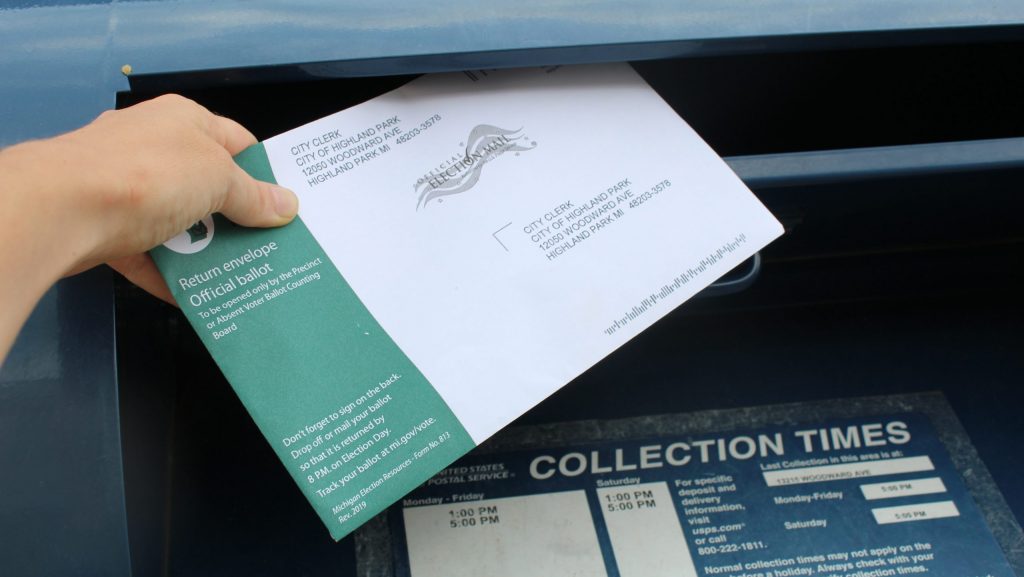Efforts to Restrict Voting in Michigan, Across U.S. Aim to Succeed Where GOP Failed in 2020 Elections, Journalist Says
Ari Berman of Mother Jones says Republicans are targeting Black and Latino voters in cities because these groups had a high and impactful turnout in the 2020 presidential election.

A voter drops an absentee ballot in a mailbox in Highland Park, Michigan in 2020.
Just two months ago, leading scholars of democracy and voting law put out a statement of concern, warning that some states, including Michigan, could be returning to a reality where Black people’s votes are suppressed once again. The statement blames factions of the Republican Party, saying the GOP no longer benefits from expanding voter rolls so they are undermining the right to vote.
“[B]ecause Republicans were unable to win the presidency and some other races and then failed to throw out those and steal the election, they are now instituting all of these new restrictions on voting to try to achieve that goal through other means.” –Ari Berman, Mother Jones
So far, 18 states have passed some type of voter suppression law in 2021 alone, with more to possibly come in places like Texas and Michigan.
Listen: Ari Berman and Craig Mauger discuss the latest voter suppression efforts.
Guests
Ari Berman is a reporter for Mother Jones magazine where he covers voting rights. Berman believes what is happening now is an effort to try and succeed where the Republicans failed in November 2020. “[B]ecause Republicans were unable to win the presidency and some other races and then failed to throw out those and steal the election, they are now instituting all of these new restrictions on voting to try to achieve that goal through other means,” Berman says.
According to Berman, the U.S. had the highest voter turnout in 120 years during the 2020 election, but that Republicans did not believe high turnout was a good thing. “Trump and other Republicans convinced many Republican voters that the election was stolen and something had to be done and that something has taken the form of all these bills introduced and passed in the states to make it harder to vote,” Berman says.
He points out that Republicans are more explicit about the groups they are targeting. “They are targeting Black voters in cities like Detroit or Latino voters in cities like Phoenix,” Berman says. “I think that the laws that have been passed now clearly tried to target the turnout of those groups that was high and impactful in 2020.”
“If they gathered 340,000 signatures, which seems like a lot but they would likely be able to do this … they could put some type of measure to enact a portion of these voting law proposals that they put out there. They can enact them through the legislature without Governor Whitmer having the chance to veto them.” –Craig Mauger, The Detroit News
Craig Mauger is a reporter covering Michigan politics for The Detroit News. Mauger says Michigan had record amounts of mail-in voting in 2020, and because of that, the Republicans caucus in the state Legislature put forward 39 bills that change many elements of Michigan election law. “Those bills were introduced on March 24. None of them have made it all the way through the Legislature right now,” he says. “It’s going to be something that’s going to be at the center of our politics in Michigan, a battleground state, for at least a year to come.”
According to Mauger, Michigan Republicans have been discussing putting forth a citizen’s initiative to try and enact at least a portion of the proposals in the Legislature, instead of going through the standard process for passing a law. “If they gathered 340,000 signatures — which seems like a lot but they would likely be able to do this … they could put some type of measure to enact a portion of these voting law proposals that they put out there. They can enact them through the Legislature without Governor Whitmer having the chance to veto them.”
Related: Michigan’s Petition Initiative Process Is A Mess (MichMash)
Some of the provisions in the Michigan bills are preventing absentee voter applications from being mailed to all registered voters, making it so voters cannot vote by drop box after 5 p.m. the day before Election Day, and disallowing clerks from putting prepaid postage on absentee ballots, requiring voters pay for the postage themselves.
As for voter identification laws, Mauger says there is a new one being debated. “If you don’t have a photo ID with you at the polls, you have to vote by a provisional ballot. Right now, you get a vote, get a normal ballot and you sign an affidavit saying ‘I don’t have an ID with me.’ When you cast a provisional ballot, you have to return six days after the election to come back and prove your identity,” says Mauger.
Web story written by Dan Netter
Trusted, accurate, up-to-date.
WDET strives to make our journalism accessible to everyone. As a public media institution, we maintain our journalistic integrity through independent support from readers like you. If you value WDET as your source of news, music and conversation, please make a gift today.
